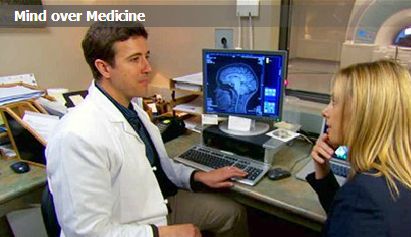Following on from the recent post on antidepressants and the placebo effect, we find a website dedicated to sharing information about antidepressant toxicity. It may be that for some people at least, the meds are not only useless but actually harmful. You be the judge! Toxic Antidepressants.
Tag Archives: Placebo Effect
Kirsch on anti-depressants vs placebo
11 Surprising Facts About Placebos
But while researchers have looked at age, gender and religiosity, among other factors, findings have been inconsistent.
"No one has been successful in identifying a profile of a placebo responder," said one researcher.
If such a group were found, she added, "drug companies would be excluding those people [from clinical trials], so they’d be able to test their drugs more correctly."
There’s an app for that …
‘New research shows that deception may not be necessary for the placebo effect’
There’s an emerging discussion on the efficacy of a placebo *even when the patient knows they’re taking a placebo*, and this is fleshed out interestingly in the discussion of whether a placebo smartphone app would actually work.
‘In future they could *be* the treatment …’
We’ve found a new website, Placeboeffect, which holds itself up as ‘The Official Placebo Effect Resource’ (whatever ‘official’ means in the world of placebos!) Here you can access classes, essays, an ebook and other resources on the phenomenon, though not placebos themselves. We think the ‘101’ guides are particularly interesting.
Also interesting is the proposition of a ‘placebo method’ which the site suggests can be more effective than simply taking a sugar pill. We agree with the general tenet of this proposition, and took quite a bit of care to suggest a protocol for taking a course of placebos, contained in a small booklet that accompanies our product. We call this ‘Creating the Conditions to Get the Most From Your Placebo"
Use placebos when you need help, or when all else fails.
Placebos stimulate your healing system to maintain wellbeing, sometimes bringing forth what seem like miraculous results. Faith, hope, trust and love optimize the conditions for the placebo effect to work. You can create such conditions by recalling the memory of a positive experience, or by simply acknowledging, in your inner being, the many reasons to be grateful for the precious gift of life, and also your capacity to ease your own physical, mental or emotional suffering. You may choose to create your own ritual, meditating on visualisations or affirmations of your intention to become well. You may choose to look to writings, art, conversations or the web for inspiration.
Be playful and light, allow room for laughter. You have nothing to lose but fear and anxiety.
Harvard says placebos are going mainstream
Mind over Medicine

More placebos in the media, this time from Australia’s 60 Minutes.
"We have in our minds, in our brains, the capacity to change the way we experience pain, to affect some of the illnesses that bring us in to see physicians. What we need to do is learn how to unlock those capacities and make use of them."
Stuff they don’t want you to know
From Howstuffworks
"Here’s where it gets crazy … (the incidence of) the placebo effect itself is increasing."
"Approximately half the drugs that fail in late stage trials fail because they simply can’t outperform placebos".
Universal Placebos in the News
Australia’s Sun-Herald newspaper referred to us in a general article on the placebo effect. Placebos: the future of medicine?
We also made it into Body & Soul magazine (in an article that looks quite similar).
The Strange Powers of the Placebo Effect
Great summary of placebo effect(s), amusing, sharp and provocative. A great way to spend three minutes!


